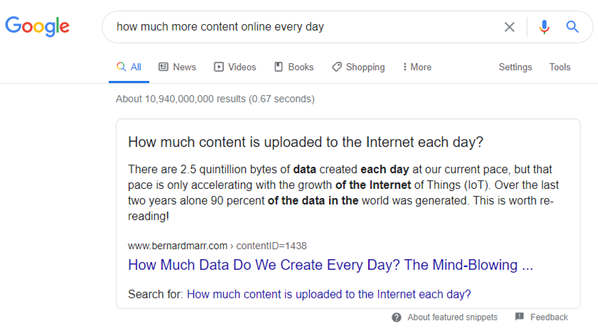The vast amounts of content available online is increasing exponentially. In response to this information overload Google is constantly improving its ranking algorithms in order to respond to queries with the best and most relevant content. As a result of these changes, the rules by which webpages are ranked are constantly changing.
One of the newer ranking policies used by Google is known as passage indexing. This method is introduced to determine the relevance of a document by understanding each subsection of text, referred to as passages, and ranking each one. In the following article we give an overview of Passage Indexing and explain its role in SEO strategy.
What is Passage-Based Indexing?

The role of passage-based indexing is for Google to gain a deeper understanding of an article by understanding the content of each sub-section or paragraph, known as passages. Upon a search query, the passages within a webpage are also ranked in response to a search query. Google will then select the most relevant passages from the most relevant pages and return them as featured snippets, as shown in Figure 1, which are small snippets of text returned directly in the search results page. By doing this Google is able to answer very specific queries directly and concisely in the search results.
Following is an example of the output of passage-based indexing: if someone were to search “when was Microsoft Windows invented?” Google will not only return the top 10 links to the most relevant article, for example by Business Insider or Wikipedia, but it will also return a featured snippet from one of these articles containing the phrase “it was invented in 1985”.
Now, readers will no longer have to go through the whole article to find the exact answer to their queries. Passage indexing has excellent potential for SEO experts as landing a spot in the featured snippet section is a sure–fire way to drive traffic to your webpage.
Google has experimented with the use of featured snippets, or similar approaches, to provide direct answers to queries since 2013. Since the implementation of the BERT algorithm, which focuses on gauging search intent, Google is now better equiped to understand exactly what a query means. Using this knowledge, it is now possible for Google to find a perfect (or near perfect) single line response from pages which do not necessarily rank very highly in the search results. This means that Google’s algorithms are now able to return specific answers to queries from pages which may not even be focused on the topic in question. For instance, if your webpage contains an article entitled “Making a profit from cryptocurrencies” which contains a passage about Bitcoin, then that specific passage can potentially be included as a featured snippet in response to a query about Bitcoin.
It is worth noting that Passage Indexing is mostly targeted at improving search results for long-tail queries. In order to provide a reliable match to a query Google must have enough information about the user’s search intent and this can only be achieved if long-tail keywords are provided.
What steps can I take to optimize for Passage Indexing?
The impact which passage indexing has on webpage ranking itself is unclear, however although passage indexing was mainly intended to benefit the user performing the search query, it may also be leveraged to benefit the webmaster.
Here are some of the most important aspects to consider when working towards optimizing your content for passage-based indexing:
- Is website structure important for Passage Indexing?
It is clear from this update that although a webpage may not rank highly, its contents may still be included as featured snippets if the content directly addresses a query. In order for this to happen the content of a passage within your page must match the long-tail keywords in the search query. It would therefore be in the best interest of webmasters to ensure that their page titles and headings are descriptive enough to be matched to the most appropriate user query. In this way, the content of each passage is more likely to be deemed relevance in response to a related search query. Google also uses header tags to understand webpage structure and locate information in a webpage. Therefore, by using proper header tags, webmasters have better chances to rank website content based on passage indexing.
- How can I optimize website content for Passage Indexing?
Google spokesperson John Mueller has said that it is not necessary to optimize website content for Passage Indexing, however, Google often responds in this way following updates on their algorithms. We must therefore aim to optimize our content intuitively. Before the passage indexing update, in order for a webpage to rank highly its entire contents had to be relevant to the search query. Now it is possible for a single paragraph or line to be included as a featured snippet even if a webpage is not very highly ranked. By observing featured snippets, it is evident that short passages with clear-cut answers and explanations are always preferred, therefore unless you are writing an article that requires detailed explanations it is best to create content which is clear-cut, to the point, and answers a question straight-away. By taking this approach, when someone carries out a long-tailed search query in Google, there will be a higher chance of Google matching a particular clear-cut passage which directly addresses the question.
When will this change go live?
Googles’ spokesperson has said that this change will go live this year, and they have initially estimated that it will impact 7% of the queries on the internet, however naturally this number is expected to be refined. In additional to this, this update will only apply for websites in US English, and has yet to be implemented for other languages.
What is the downside of Passage Indexing?
The flipside of the passage indexing update is quite daunting for websites who wish to driver traffic to their site: if your content directly answers a user’s query in the form of a featured snippet then the user is unlikely to visit your website. In addition to this, if the featured snippet contains information which is not directly related to the overall category of the article, then the user is unlikely to read on. This may contribute to the increasing number of Google searches which do not result in a click and may therefore reduce website traffic.
Takeaway
Googles’ most recent update of passage indexing will likely impact of 7% of the queries searched on Google. A benefit for the users is that now Google will not recommend irrelevant articles for their queries. Instead, it will give them relevant articles, highlighting the particular passage that answers a specific user‘s questions. Although this is an ideal scenario for the user, it may result in a zero-click search and although your webpage’s contents may rank as a featured snippet, this will not necessarily drive additional traffic or relevant traffic to your website. It is clear that passage indexing will play a significant role in which webpages the user may visit first, however it is important to note that the ranking of webpages is calculated using other algorithms and it is therefore important to consider other essential SEO factors as well.

Dr Michaela Spiteri BEng, MSc, PhD (AI / Healthcare domain), is a well-published researcher in the field of AI and machine-learning. She is the founder of AI consultancy Analitigo Ltd. Currently working as the lead researcher at Gainchanger.

